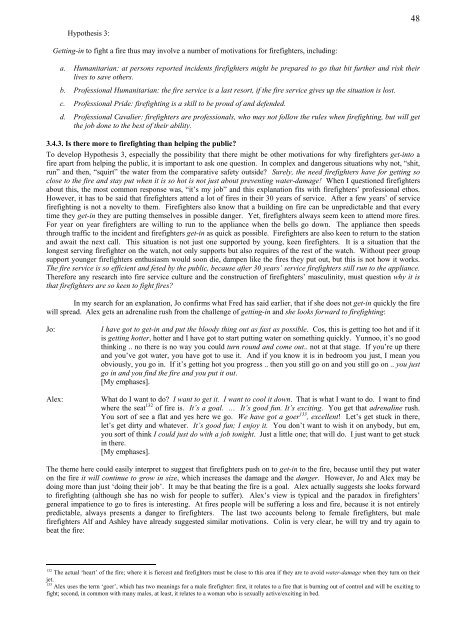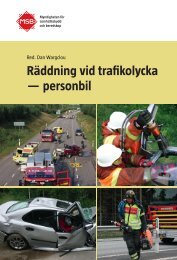One more last working class hero
One more last working class hero
One more last working class hero
Create successful ePaper yourself
Turn your PDF publications into a flip-book with our unique Google optimized e-Paper software.
Hypothesis 3:<br />
48<br />
Getting-in to fight a fire thus may involve a number of motivations for firefighters, including:<br />
a. Humanitarian: at persons reported incidents firefighters might be prepared to go that bit further and risk their<br />
lives to save others.<br />
b. Professional Humanitarian: the fire service is a <strong>last</strong> resort, if the fire service gives up the situation is lost.<br />
c. Professional Pride: firefighting is a skill to be proud of and defended.<br />
d. Professional Cavalier: firefighters are professionals, who may not follow the rules when firefighting, but will get<br />
the job done to the best of their ability.<br />
3.4.3. Is there <strong>more</strong> to firefighting than helping the public?<br />
To develop Hypothesis 3, especially the possibility that there might be other motivations for why firefighters get-into a<br />
fire apart from helping the public, it is important to ask one question. In complex and dangerous situations why not, “shit,<br />
run” and then, “squirt” the water from the comparative safety outside? Surely, the need firefighters have for getting so<br />
close to the fire and stay put when it is so hot is not just about preventing water-damage! When I questioned firefighters<br />
about this, the most common response was, “it’s my job” and this explanation fits with firefighters’ professional ethos.<br />
However, it has to be said that firefighters attend a lot of fires in their 30 years of service. After a few years’ of service<br />
firefighting is not a novelty to them. Firefighters also know that a building on fire can be unpredictable and that every<br />
time they get-in they are putting themselves in possible danger. Yet, firefighters always seem keen to attend <strong>more</strong> fires.<br />
For year on year firefighters are willing to run to the appliance when the bells go down. The appliance then speeds<br />
through traffic to the incident and firefighters get-in as quick as possible. Firefighters are also keen to return to the station<br />
and await the next call. This situation is not just one supported by young, keen firefighters. It is a situation that the<br />
longest serving firefighter on the watch, not only supports but also requires of the rest of the watch. Without peer group<br />
support younger firefighters enthusiasm would soon die, dampen like the fires they put out, but this is not how it works.<br />
The fire service is so efficient and feted by the public, because after 30 years’ service firefighters still run to the appliance.<br />
Therefore any research into fire service culture and the construction of firefighters’ masculinity, must question why it is<br />
that firefighters are so keen to fight fires?<br />
In my search for an explanation, Jo confirms what Fred has said earlier, that if she does not get-in quickly the fire<br />
will spread. Alex gets an adrenaline rush from the challenge of getting-in and she looks forward to firefighting:<br />
Jo:<br />
Alex:<br />
I have got to get-in and put the bloody thing out as fast as possible. Cos, this is getting too hot and if it<br />
is getting hotter, hotter and I have got to start putting water on something quickly. Yunnoo, it’s no good<br />
thinking .. no there is no way you could turn round and come out.. not at that stage. If you’re up there<br />
and you’ve got water, you have got to use it. And if you know it is in bedroom you just, I mean you<br />
obviously, you go in. If it’s getting hot you progress .. then you still go on and you still go on .. you just<br />
go in and you find the fire and you put it out.<br />
[My emphases].<br />
What do I want to do? I want to get it. I want to cool it down. That is what I want to do. I want to find<br />
where the seat 132 of fire is. It’s a goal. … It’s good fun. It’s exciting. You get that adrenaline rush.<br />
You sort of see a flat and yes here we go. We have got a goer 133 , excellent! Let’s get stuck in there,<br />
let’s get dirty and whatever. It’s good fun; I enjoy it. You don’t want to wish it on anybody, but em,<br />
you sort of think I could just do with a job tonight. Just a little one; that will do. I just want to get stuck<br />
in there.<br />
[My emphases].<br />
The theme here could easily interpret to suggest that firefighters push on to get-in to the fire, because until they put water<br />
on the fire it will continue to grow in size, which increases the damage and the danger. However, Jo and Alex may be<br />
doing <strong>more</strong> than just ‘doing their job’. It may be that beating the fire is a goal. Alex actually suggests she looks forward<br />
to firefighting (although she has no wish for people to suffer). Alex’s view is typical and the paradox in firefighters’<br />
general impatience to go to fires is interesting. At fires people will be suffering a loss and fire, because it is not entirely<br />
predictable, always presents a danger to firefighters. The <strong>last</strong> two accounts belong to female firefighters, but male<br />
firefighters Alf and Ashley have already suggested similar motivations. Colin is very clear, he will try and try again to<br />
beat the fire:<br />
132 The actual ‘heart’ of the fire; where it is fiercest and firefighters must be close to this area if they are to avoid water-damage when they turn on their<br />
jet.<br />
133 Alex uses the term ‘goer’, which has two meanings for a male firefighter: first, it relates to a fire that is burning out of control and will be exciting to<br />
fight; second, in common with many males, at least, it relates to a woman who is sexually active/exciting in bed.
















